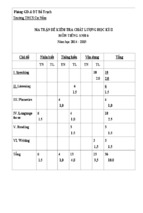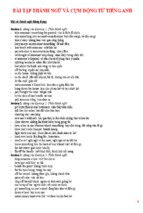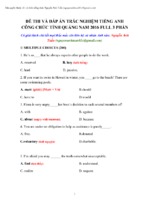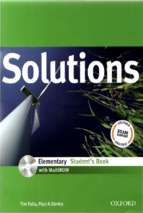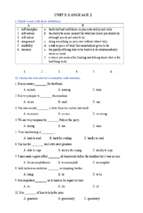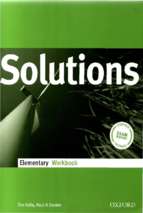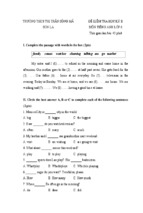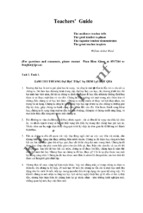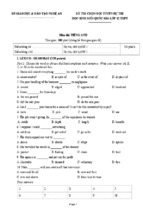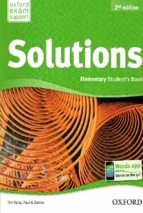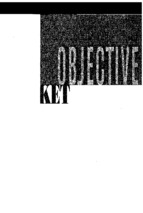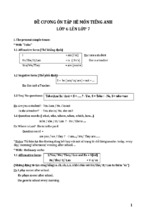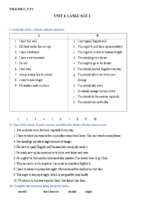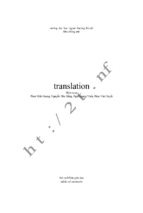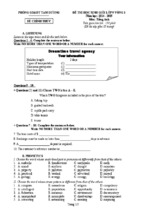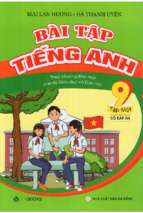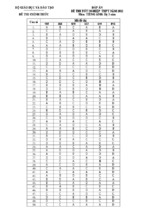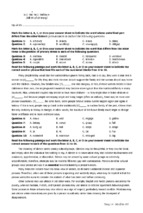TÀI LIẸ U TIẾNG ANH LỚP 9
CHƯƠNG TRÌNH MỚI
BÀI TẬP CƠ BẢN VÀ NÂNG CAO
HOÏ VAØ TEÂN: ………………………………………
1
TOPIC 1: SINGULAR OR PLUAL
PHÂN BIỆT CHỦ NGỮ SỐ ÍT VÀ SỐ NHIỀU
Số ít
Số nhiều:
He
You and I
She
is
They
are
It
You/ We
was
were
Mai/ Lan
Mai and Lan
Miss Hoa / Ms. White/Mrs. Pike
The Browns
does
do
(My) mother / Father
Mum and dad
(My) Brother / Sister
My parents
has
have
(My) Uncle / Aunt
My grandparents
(My) Grandfather/mother
stop
stops
A Boy / Girl / Baby
Boys /Girls / Babies
A watch / An apple
Some watches / apples
like
likes
A knife / A kilo
A lot of knives / A dozen
This / That friend
These / Those friends
goes
go
Every / Each student
All /Both students
Her school
Many schools
studies Ones/ things
study
No one/body/thing
Everyone/body/thing
Anyone/body/thing
Someone/body/thing
Another pen
Other pens
A child
Some children
A man
Two men
A woman
women
A foot
Three feet
A person
Many People
A tooth
Teeth
A mouse
Mice
One of the main problems
The main problems
The leg of the table
The legs of the table
The student in blue eyes
The students in uniform
A man with his dogs
Those men with their dog
Danh từ không đếm được số ít:
Các chất: cream (kem), sugar(đường), bread (bánh mì), flour (bột mì), water, wine (rượu) , milk
Các khái niệm: hope (hy vọng), peace (hòa bình), beauty, entertainment (giải trí), freedom
Cảm xúc hay phẩm định : anger (cơn giận), joy (niềm vui), honesty (sự chân thật), pride (s. tự hào)
Hoạt động : homework, sleep, surveillance (giám sát)
News, physics, homework, goods
+ Không dùng mạo từ (a/an) :
Drink water if you are thirsty. (not: a water)
+ Dùng động từ số ít: a singular verb. :
Water is safe to drink in this area.
2
Một số danh từ không đếm được phổ biến ở dạng số ít:
Advice
tư vấn
luggage
hành lý
accommodatio chỗ ở
money
tiền bạc
nbaggage
hành lý
music
âm nhạc
bread
bánh mz
news
tin tức
cheese
pho mát
pasta
mì ống
equipment
trang thiết bị
progress
tiến bộ
furniture
đồ nội thất,
research
nghiêncứu
happiness
information
knowledge
literature
sadness
travel
water
work ..
hạnh phúc
thông tin
kiến thức
văn học buồn
bã
du lịch
nước
công việc
Danh từ đếm được số ít:
+ Dùng kèm Determiners (the/a/an), every, each, this, that, my, another..)
Danh từ đếm được phổ biến luôn ở dạng số nhiều:
- cattle (trâu bò), people (người ta), police (cảnh sát), thanks (lời cám ơn), trousers (quần dài), scissors
(cái kéo), glasses (kính mắt), clothes (áo quần), folk (dân gian)… (Marginalia, Shenanigans, Loggerheads,
Cahoots, Amends, Smithereens)
+ Dùng kèm Determiners (the, both, a pair of, these/ those/ my/ other..)
Danh từ số ít và số nhiều giống nhau:
fish
cá
series
loạt
deer
con nai
species
loài
sheep
con cừu
means
phương tiện
shrimp
con tôm
grapefruit trái bưởi
offspring
con cái
aircraft
phi cơ
TOPIC 2: SUBJECT AND VERB AGREEMENT
I. Singular verb (Động từ số ít):
1. Hai danh từ cùng chỉ một người, một vật, một thứ:
EX: The writer and poet is coming tonight. ( Nhà văn kiêm nhà thơ sẽ đến tối nay.)
2. Each / Every / either/ neither + { danh từ số ít} / { of + danh từ số nhi ều } Động từ số ít
Each of children has a toy. ( Mỗi trẻ đều có một đồ chơi.)
3. Someone, somebody, no one, nobody, anyone, anybody, everyone something, nothing, anything,
everything
EX: Everything looks bright and clean. (Mọi thứ có vẻ sáng sủa và sạch sẽ.)
4. Các danh từ chỉ môn học, tên bệnh và tên quốc gia kết thúc là ‘s’:
NEWS (bản tin), PHYSICS (môn lý), ECNOMICS (kinh tế học), MATHEMATICS (toán), POLITICS (chính
trị học), ATHLETES (môn điền kinh), MEALES (bệnh sởi), MUMPS (bệnh quai bị), the PHILIPINES
(nước Phi), the United States (nước Mỹ)....
EX: Physics is more difficult than chemistry. (Môn l{ thì khó hơn môn hoá.)
5. Các danh từ không đếm được:
FURNITURE (đồ đạc), TRAFFIC ( giao thông), KNOWLEDGE (kiến thức), HOMEWORK... (bài tập)
EX: The furniture is m ore expensive than we think. ( Món đồ thì đắt hơn chúng ta nghĩ.)
6. Các từ chỉ số lượng, thời gian, khoảng cách và tiền:
EX: Four weeks is a longer time to wait him. ( 4 tuần là một khoảng thời gian dài để chờ cậu ấy.)
Three thousand dollars is a big sum of money. (3000 US$ là một khoản tiền lớn.)
II. Plual verb (Động từ số nhiều):
3
1. Hai danh từ chỉ hai người, hai vật, hai thứ khác nhau:
Ex:Water and oil do not mix. ( Nước thì không hoà tan với dầu ăn.)
2. Tính từ được dùng như danh từ :
The + ADJ: the poor (người nghèo), the sick (người bệnh), the rich (người giàu),
Ex:The rich are not always happy. ( Người giàu không phải lúc nào cũng hạnh phúc.)
3. Các danh từ PEOPLE (người ta), POLICE (cảnh sát), CATTLE (súc vật)
Ex:The police has arrested the thieves ( Cảnh sát vừa bắt bọn ăn trộm.)
4. Các từ A FEW, BOTH....
Ex: A few books I read are famous. ( Một số sách tôi đã đọc thì nỗi tiếng.)
III. Singular or plual verbs (Số nhiều hoặc số ít):
1. The number of + DT số nhiều Động từ số ít
A number of + DT số nhiều Động từ số nhiều
Ex: The number of students in this class is small. A number of children like cakes.
2. NO + DT số ít Động từ số ít
NO + DT số nhiều Động từ số nhiều
Ex: No student is in the hall. No students are on the schoolyarD.
3. All / some/ none /plenty/ half/ most/ a lot / lots + OF+ DT số ít Động từ số ít
All / some/ none /plenty/ half/ most/ a lot / lots + OF+ DT số nhiều Động từ số nhiều
Ex: None of the boys is good at English.
4. There ( be) + N:
There is a fire in this room. There are five poe[le coming here.
5. The committee (uỷ ban), group (nhóm), team (đội), class (lớp), family (gia đình)
IV. Hợp với chủ ngữ gần: (Danh từ liên kết bởi cặp từ nối song song)
1. EITHER
OR
2. NEITHER
+ N1 + NOR
+ N2 + verb
3. NOT ONLY
BUT ALSO
Ex: Not only my brother but also my sister is here.
V. Hợp với chủ ngữ xa: (Danh từ đựơc bổ nghĩa bởi cụm giới từ)
- One of the boxes is open
WITH / ON THE/ OF THE/ IN...
- The book, including all the chapters in section, is
TOGETHER WITH
anxious.
N1+ INCLUDING
+ N2 + VERB
- The team captain, as well as his players, is boring.
ACCOMPANIED BY
- The womanboring.
with all the dogs walks down my
AS WELL AS
street.
- The people who listen to that music are few.
I. Choose the correct form of the verb that agrees with the subject.
1. Annie and her brothers (is, are) at school.
2. Either my mother or my father (is, are) coming to the meeting.
3. The dog or the cats (is, are) outside.
4. Either my shoes or your coat (is, are) always on the floor.
5. George and Tamara (doesn't, don't) want to see that movie.
6. Benito (doesn't, don't) know the answer.
7. One of my sisters (is, are) going on a trip to France.
8. The man with all the birds (live, lives) on my street.
9. The movie, including all the previews, (take, takes) about two hours to watch.
10. The players, as well as the captain, (want, wants) to win.
4
11. Either answer (is, are) acceptable.
12. Every one of those books (is, are) fiction.
13. Nobody (know, knows) the trouble I've seen.
14. (Is, Are) the news on at five or six?
15. Mathematics (is, are) John's favorite subject, while Civics (is, are) Andrea's favorite subject.
16. Eight dollars (is, are) the price of a movie these days.
17. (Is, Are) the tweezers in this drawer?
18. Your pants (is, are) at the cleaner's.
19. There (was, were) fifteen candies in that bag. Now there (is, are) only one left!
20. The committee (debates, debate) these questions carefully.
21. The committee (leads, lead) very different lives in private.
22. The Prime Minister, together with his wife, (greets, greet) the press cordially.
23. All of the CDs, even the scratched one, (is, are) in this case.
24. The man with his son (walk, walks) down my street.
25. One of the students (are, is) late.
II. Complete the correct form of the verb that agrees with the subject
1. .She and her friends (be) ............................ at the fair.
2. The book or the pen (be) ............................ in the drawer.
3. The boy or his friends (run) ............................ every day.
4. His friends or the boy (run) ............................ every day.
5. He (not like) ............................ it. They (not like) ............................ it.
6. One of the boxes (be) ............................ open
7. The people who listen to that music (be) ............................ few.
8. The team captain, as well as his players, (be) ............................ anxious.
9. The book, including all the chapters in the first section, (be) ............................ boring.
10. The woman with all the dogs (walk) ............................ down my street.
11. Each of these hot dogs (be) ............................ juicy.
12. Everybody (know) ............................ Mr. Jones.
13. Either (be) ............................ correct.
14. The news (be) ............................ on at six.
15. Five dollars (be) ............................ a lot of money.
16. Dollars (be) ............................ often used instead of rubles in Russia.
17. These scissors (be) ............................ dull.
18. Those trousers (be) ............................ made of wool.
19. There (be) ............................ many questions.
20. There (be) ............................ a question.
21. The team (run) ............................ during practice.
22. The committee (decide) ............................ how to proceed.
23. The family (have) ............................ a long history.
24. My family (have) ............................ never been able to agree.
25. The President, accompanied by his wife, (be) ............................ traveling to India.
26. All of the books, including yours, (be) ............................ in that box.
27. The football team, including the goal keeper (be) ............................ 11 players.
28. The news (be) ............................ on TV is very informative.
29.
30.
31.
32.
My family (have) ............................ never been able to agree.
The President, accompanied by his wife, (be) ............................ traveling to IndiA.
All of the books, including yours, (be) ............................ in that box.
The football team, including the goal keeper (be) ............................ 11 players.
5
TOPIC 3: TENSES (THÌ)
I. THE DIFFERENCES BETWEEN PRESENT SIMPLE AND PRESENT PROGRESSIVE:
Present simple
TOBE :S + am / is /are + C
ORDINARY VERBS : (động từ thường)
- S + V (s ) / V (es ) / V1
- S + do /does + not + V1
- Do /does + S + V1 ?
+ Yes, S + do / does.
+ No, S + don’t / doesn’t.
- Wh-word + do/does + S + V1?
Present progressive
TOBE : S + am / is /are + C
* S+ am /is / are + V –ing …
* S + am / is / are + not + V-ing …
* Am / is / are + S + V –ing ……..?
+ Yes, S + am /is / are.
+ No, S + am not /isn’t / aren’t.
- Wh-word + am /is / are + S + V-ing?
1. Hành động lặp lại thường xuyên theo thói
quen, phong tục và khả năng:
- I work in New York.
2. Hành động có tính bền vững,
Every day he goes to work by bus.
1. Hành động đang xảy ra tại thời điểm nói.
He is playing tennis now.
3. Diễn tả một chân lý hiển nhiên: đặc điểm,
cấu tạo, bản chất
- It rains a lot in HCM City.
3. Diễn tả sự thay đổi của một sự vật, thường
dùng với từ get/ become/ increase/ change.
He is getting older. Let go home. It’s getting dark.
4. Thời khoá biểu, lịch trình, chương trình
công cộng ở tương lai gần:
The train for Hanoi leaves at 7.30 tonight.
4. Sự sắp xếp cá nhân như cuộc hẹn, hội họp, du
lịch, kế hoạch ở tương lai gần:
- She is arriving at 11 o’clock.
5. Chỉ nhận thức, cảm xúc, tình trạng, sở hữu,
tồn tại, nhu cầu tại thời điểm nói: see, think,
believe, feel, look, smell, taste, hear, love, like,
need, hate, enjoy, want…
I know you are busy now.
I feel tired at present.
6. Chú ý:
a. This soup smells good. (smell: có mùi)
b. The noodles taste so delicious. (có vị)
b. He has a house at the moment. (có, sở hữu)
c. He feels better now. (cảm thấy)
d. He looks tired. (có vẻ)
*Dấu hiệu: often, usually, always, never,
sometimes, seldom, hardly, frequently,
occasionally, rarely, normaly,every, on Sunday,
in the morning, in summer, on weekdays …
5. Diễn tả sự phàn nàn dùng kèm với ALWAYS:
He is always coming to class late.
You are always asking for money.
He is always borrowing my ruler.
Mr. Nam is always forgetting his umbrella.
2. Hành động có tính tạm thời: (today, this week,
this year...)
- Today he is going by motorbike.
6. Chú ý:
a. The girl is smelling the soup. (smell: đang ngửi)
b. The cook is tasting the noodles. (đang nêm)
b. He is having lunch at the moment. (đang ăn)
c. He is feeling better now. (cảm thấy sự thay đổi)
d. He is looking at me. (đang nhìn)
Dấu hiệu:
Now, ( today), at present, at the
moment, look, listen, be careful, keep silent,
right now, hurry up, be quiet, at this time, hey,
Don’t make noise,
6
Exercise 1: Write the E/ES forms for the verbs.
1. shine -> shines
2. win ______________________
3. join ______________________
4. sign ______________________
5. sly _______________________
6. pay ______________________
7. study _____________________
8. enjoy _______________________
9. play ______________________
10. buy ____________________
1. dream -> dreams
2. come ______________________
3. do _______________________
4. wash _______________________
5. watch ________________________
6. miss _________________________
7. push _______________________
8. box _______________________
9. go _______________________
10. kiss _____________________
Exercise 2: Dùng "do not" hoặc "does not" để hoàn thành những câu sau
1.I ................... ......... prefer coffee.
2. She ................... ......... ride a bike to her office.
3.Their friends ................... ......... live in a small house.
4. They ................... ......... do the homework on weekends.
5. Mike ................... ......... play soccer in the afternoons.
6. The bus ................... ......... arrive at 8.30 a.m.
7. We ................... ......... go to bed at midnight.
8. My brother ................... ......... finish work at 8 p.m.
Exercise 3: Hoàn thành cách câu sau:
1. ................... Jack like eating hamburgers?
=> Yes, ...................
2. ................... you get up early on Sundays?
=> No, ...................
3. ................... the students always work hard for the exam?
=> No, ...................
4. ................... the train leave at noon every day?
=> Yes, ...................
5. ................... he often play the guitar?
=> No, ...................
6. ................... they take a taxi to school every morning?
=> Yes, ...................
7. ................... Anna and Daisy visit their old teachers on winter holidays? => No, ...................
8. ................... water boil at 100 degrees Celsius?
=> Yes, ...................
Exercise 4:Hoàn thành các câu sau
1.Robin (play) ................... football every Sunday.
2. We (have).................................. a holiday in December every year.
3.He often (go).................................. to work late.
4. The moon (circle).................................. around the earth.
5.The flight (start).................................. at 6 a.m every Thursday.
6. Peter (not/ study).................................. very hard. He never gets high scores.
7.My mother often (teach).................................. me English on Saturday evenings.
8.I like Math and she (like).................................. Literature.
9.My sister (wash).................................. dishes every day.
10. They (not/ have)................... breakfast every morning.
Exercise 5: Hoàn thành cách câu sau với từ trong ngoặc
S + (adv) + V (present simple) + Modifiers (Nouns/ Adjectives / Adverbs)
1. My brothers (sleep) on the floor. (often)
=> ………………………………………………………………………………………………………
2. He (stay) up late? (sometimes)
=> ………………………………………………………………………………………………………
3. I (do) the housework with my brother. (always)
=> ………………………………………………………………………………………………………
7
4. Peter and Mary (come) to class on time. (never)
=> ………………………………………………………………………………………………………
5. Why Johnson (get) good marks? (always)
=> ………………………………………………………………………………………………………
6. You (go) shopping? (usually)
=> ………………………………………………………………………………………………………
7. She (cry). (seldom)
=> ………………………………………………………………………………………………………
8. My father (have) popcorn. (never)
=> ………………………………………………………………………………………………………
Exercise 6:
Mary is a teacher. She teaches English. The children love her and they (1).........a lot from her. Mary (2)
................... home at 3.00 and (3)................... lunch. Then she sleeps for an hour. In the afternoon she
(4)................... swimming or she cleans her house. Sometimes she (5)................... her aunt and
(6)................... tea with her. Every Sunday she does the shopping with her friends.
Exercise 7:
My cousin, Peter (have)................... .a dog. It (be) ................... .an intelligent pet with a short tail and
big black eyes. Its name (be)................... .Kiki and it (like) ................... .eating pork. However, it (never/
bite) ................... .anyone; sometimes it (bark) ................... .when strange guests visit. To be honest, it
(be) ................... .very friendly. It (not/ like) ................... .eating fruits, but it (often/ play)...................
.with them. When the weather (become) ................... .bad, it (just/ sleep) ................... .in his cage all
day. Peter (play) ................... .with Kiki every day after school. There (be) ................... .many people on
the road, so Peter (not/ let) ................... .the dog run into the road. He (often/ take) ................... .Kiki to
a large field to enjoy the peace there. Kiki (sometimes/ be) ................... naughty, but Peter loves it very
much.
* Một số động từ trạng thái không được chia thì HTTD. Vì vậy dù khi có dấu hiệu của HTTD ta vẫn
chia thì HTĐ:
Chỉ ước muốn:
Chỉ nhận thức:
Chỉ cảm giác
Chỉ sở hữu:
Chỉ sự tồn tại:
like (muốn)
love (yêu)
hate (ghét)
want (muốn)
need (cần)
prefer
(thích hơn)
enjoy
dislike
mind (phiền)
care
(quan tâm)…
know (biết)
realize (nhận ra)
suppose (giả sử)
mean (có nghĩa {)
understand (hiểu)
believe (tin tưởng)
remember (nhớ),
forget (quên)
desire (ao ước)
remember (nhớ)
think (nghĩ)
impress (gây ấn
tượng)
See
(thấy)
Hear
(nghe)
Smell
(có mùi)
taste
(có vị)
seem
(có vẻ)
touch
Own/ have: có,
belong
(thuộc về)
possess
(sở hữu)
be: thì / là
contain
(chứa đựng)
consist of
(gồm có)
depend
(phụ thuộc)
seem (có vẻ)
include
(bao gồm)
8
* Exercise 8: Add the -ing forms to the verbs.
1. shine ........shining................
2. win ______________________
3. join ______________________
4. sign ______________________
5. sly _______________________
6. pay ______________________
7. study _____________________
8. get _______________________
9. wait ______________________
10. write ____________________
1. dream ...........dreaming............
2. come ______________________
3. look _______________________
4. take _______________________
5. bite ________________________
6. hit _________________________
7. hurt _______________________
8. clap _______________________
9. keep _______________________
10. camp _____________________
* Exercise 9: Put the verbs into correct tense:
1.They (work ) in the field at the moment.
-> …………………………………………………………………………………………………
2.Listen ! The girls ( play ) the piano .
->……………………………………………………………………………………………………
3.What you (do ) now ? We ( plant) trees.
-> …………………………………………………………………………………………………
4.Lan and Nga ( read ) in the library at the moment.
-> …………………………………………………………………………………………………
5.Hurry up ! The bus ( come ) in.
-> …………………………………………………………………………………………………
6.They (do ) some experiments now ?
-> …………………………………………………………………………………………………
7.Look! The boys ( cry).
-> …………………………………………………………………………………………………
8.Trang (have ) breakfast now ? No, She (make ) a dress now.
-> …………………………………………………………………………………………………
9. Where (be) your brothers now ? They ( be ) in the room. They (play )
chess.
-> …………………………………………………………………………………………………
10.Be quiet.!The baby ( sleep).
-> …………………………………………………………………………………………………
Bài tập nâng cao:
Exercise 10. Give the correct form of these verbs.
1, It (get) ……………………………dark. Shall I turn on the light?
2, They don't have anywhere to live at the moment.
They(stay) ……………………………with friends until they find somewhere.
3, Why are all these people here? What (happen). ……………………………?
4, Where is your mother? She …………………………… (have) dinner in the kitchen
5, The student (not, be) ……………………………in class at present
6, Some people (not drink) ……………………………coffee now.
7, At present, he (compose) ……………………………a piece of music
8, We (have) ……………………………dinner in a restaurant right now
9
Exercise 11. Give the correct form of these verbs: (Present simple and present progressive)
1. The sun (set) …………in the West. The earth (circle) ……………the Sun once every 365 days.
2. It usually (rain) ……………in the summer. Rivers usually (flow) ………………to the sea.
3. They (often build) ………………… hotels, but this year they (build) ……………… hospitals.
4. Bees (make) …………………………honey.
5. They (get) …………………………on the scale now.
6. Don’t worry. I (give) ……………………him your message when I (see) ……………………… him.
7. Look! Jane (play) ................... ....the guitar. this afternoon she (play) …………………… table tennis.
8. I (not talk) …………………………to her at present.
9. How often…………………………she (go) …………………………fishing?
- She (go) …………………………once a year.
10. ................... your friends (be)…………………… students? - Yes, they (be) ...................
11. …………………… .the children (play…………………………in the park at the moment?
- No, they aren’t. They (learn) ................... .to play the piano.
12. ………….you (go)………………………….. to school on Sundays? – Yes, I do.
13. My mother (cook) ………………………a meal now. She ( cook) ………………………everyday.
14. What…………your mother (do)……………. at this time? - She (make) ………………a dress.
15. ………………………………. she often (go)……………………… to the cinema every weekend?
- I don’t know. But she always (go) ................... ........to the church on Sundays.
16. Hurry up! The bus (come) …………………………… .
19. The students (not be) …………………………in class at present.
20. She always (wash) …………………………the dishes after meals.
21. What____________ your father usually ____________ (do) in the evenings ?
22. He usually ____________ (watch)TV. He (not talk) ____________ to her at present.
23. He____________ (be) out at the moment but he____________ (be) back at about seven o’clock.
24. I can ____________ (see) the children. They____________ (play) in the yard.
Exercise 12. Give the correct form of these verbs: (Present simple and present progressive)
1. Please be quiet, I ................... ........(try) to concentrate.
2.I ................... ..(not/belong) to a political party.
3.Hurry! The bus ................... ..(come). I ................... ..(not/want) to miss it.
4.The River Nile ................... ..(flow) into the Mediterranean.
5.The river ................... ..(flow) very fast today – much faster than usual.
6.................... ..(it/ever/snow) in India?
7.We usually ................. (grow) vegetables but this year we ................... (not.grow) any.
8.A: Can you drive?
9.B: No, but I ................... ..(learn). My father ................... ..(teach) me.
10. You can borrow my umbrella. I ................... ..(not/need) it at the moment.
11. (at a party) I usually .................. (enjoy) parties but I ................(not/enjoy) this one very much.
12. George says he’s 80 years old but i ................... ..(not/believe) him.
13. Ron is in London at the moment. He ................... ..(stay) at the Hilton Hotel. He usually
................... ..(stay) at the Hilton Hotel when he’s in London.
14. Look! It’s ................... ........(snow).
15. “Where ................... your father (come) from?” “He ................... come) from Scotland”.
10
II. THE DIFFERENCES BETWEEN PAST SIMPLE AND PRESENT PERFECT:
Present perfect
Past simple
*TOBE: S + was / were + C
S + was / were + not + C
- S + have/ has + V3
Was /were + S + C ?
- S + haven’t/ hasn’t + V3
*ORDINARY VERBS: ( Động từ thường )
- Have/ Has + S + V3?
- S + V2 / V-ed …
+ Yes, S + have/ has.
- S + didn’t + V1 …
+ No, S + haven’t/ hasn’t.
- Did + S +V1. .?
- Wh- word + have/ has + S +V3?
+ Yes, S + did.
+ No, S + / didn’t.
- Wh-word + did + S + V1?
1. Hành động đã xảy ra trong quá khứ và còn 1. Hành động đã xảy ra và hoàn toàn chấm dứt
kéo dài đến hiện tại.
trong quá khứ.
This is my hometown. I have lived here for six I have lived here for six years then I moved to
years.
the city.
2.Hành động đã xảy ra không biết rõ thời gian: Hành động đã xảy ra biết rõ thời gian:
just, already, recently, ever, once…
yesterday, last night, 3 years ago…
I have already visited New York twice.
- I visited New York last Winter.
2. Hỏi về thời gian quá khứ dùng kèm với since 2. Hỏi về thời gian quá khứ dùng kèm với
when, how long :
when, how long ago:
- Since when have you started school?
- When did you start school?
- How long have you waited for me?
- How long ago were you here?
3. Bắt đầu một tình huống:
3. Tiếp tục tình huống đó:
- Have you met Tom recently/ yet?
- When did you meet him?
Yes, I have.
Three days ago.
4. Dùng kèm for: Hành động đã xảy ra và còn
lưu lại trong hiện tại:
John has lived in that house for 20 years.
(He still lives there.)
5. Dùng trong cấu trúc
It’s the first / second time + S + have/ has + V3
S + have/ has + V3 + since + S + V2
He has played tennis since he was 11.
4. Dùng kèm với for: Hành động đã xảy ra và
hoàn toàn kết thúc trong quá khứ:
John lived in that house for 20 years. Then he
moved to a new one.
5. Dùng trong cấu trúc
The last time + S + V2 …..+ V2
If + V2…. , S + would/could + V1.
The last time he played tennis was 11 years ago.
If I were you, I would agree at once.
*Dấu hiệu: just, yet, already, ever., never…
* Dấu hiệu: yesterday, last, ago, first, later,
before, since, for, so far, up to now, recently, after that, finally, at last, < 2013
lately, many times, several times, …
- In/Over/During/For + the + past/last +
time: trong thời gian qua
11
PRACTICE
* Exercise 1: Add the -ed form to the verbs.
1. live
--> …………………………………
2. love
--> …………………………………
3. agree
--> …………………………………
4. believe
--> …………………………………
5. invite
--> …………………………………
6. study
--> …………………………………
7. worry
--> …………………………………
8. marry
--> …………………………………
9. carry
--> …………………………………
10. play
--> …………………………………
* Exercise 2: Write the past forms of the verbs.
V2
V3
V1
Wass/ were Been
1
Be
2
Bring
3
Come
4
Cut
5
Drink
6
Bring
7
Build
8
Buy
9
Drive
10 Feel
*Exercises 3: Put the verbs into correct tenses
1. My uncle ( be) ill yesterday.
…………………………………………………
2.The women (be )in the park five minutes ago.
…………………………………………………
3. He (be) late for school yesterday.
…………………………………………………
4.We ( be ) at the party last night.
…………………………………………………
5. You (be ) at home yesterday morning.
…………………………………………………
6. Ms Ngan (be ) tired last week.
…………………………………………………
7.Her mother ( be) in hospital last week.
…………………………………………………
8.They ( be) happy last night.
…………………………………………………
9.Miss Huong ( be) a good doctor ten years ago.
…………………………………………………
10.He ( not be) there last week.
…………………………………………………
11.
12.
13.
14.
15.
16.
17.
18.
19.
20.
11
12
13
14
15
16
17
18
19
20
stay
--> …………………………………
enjoy --> …………………………………
stop --> …………………………………
fit
--> …………………………………
plan --> …………………………………
pre’fer --> …………………………………
per’mit --> …………………………………
want --> …………………………………
look --> …………………………………
finish --> …………………………………
V1
Meet
Put
Sleep
send
Spend
read
Speak
Send
Take
Think
Win
Write
V2
V3
11. My brother ( not be ) in the library two hours
ago.
…………………………………………………
12. Mrs Vi ( not be ) better last night.
…………………………………………………
13. These men( not be) here yesterday.
…………………………………………………
14.My friend and I (be) in Nha Trang last month?
…………………………………………………
15.Nhan ( be) a good student last year?
…………………………………………………
16. Mr Trung ( be) here in 2010?
……………………………………………………
17.You ( be) at the seaside last Sunday?
……………………………………………………
18.His brothers ( be) good workers last year?
……………………………………………………
19.His sisters ( be) ill last night?
……………………………………………………
20.This boy( be) fine yesterday?
……………………………………………………
12
Exercise 4:
1.We ( drink) a lot of milk last year.
…………………………………………………
2.Ha ( speak) English well last month.
…………………………………………………
3.Thu ( feel ) well last night.
…………………………………………………
4.Vi ( give) me a present last Sunday.
…………………………………………………
5.Her mother ( go) shopping last week.
…………………………………………………
6.She ( feel) sad last night.
…………………………………………………
7. Hung ( stay ) up late last night.
…………………………………………………
8.Mi ( receive) a letter two days ago.
…………………………………………………
9.Huong (make ) a big cake three hours ago.
…………………………………………………
10.They ( watch) this film last week.
…………………………………………………
11. I ( meet ) her at the movie theater last night.
…………………………………………………
12. They ( study ) hard last year.
…………………………………………………
13. He ( build ) a new house last year.
…………………………………………………
14. Nam (not visit ) us yesterday
…………………………………………………
15. You ( not buy ) a new car two month ago.
…………………………………………………
*CÁCH CHIA THÌ HTHT:
1.I just (come ) back.
I have just come back.
2 He already ( see ) this film.
He has already seen ………..
3. We ( not visit ) him yet.
We haven’t visited ………..
16.Mr Tan ( not teach ) in this school in 1986.
…………………………………………………
17. Her father ( not repair ) her watch yesterday.
…………………………………………………
18. He ( play) chess last night ?
…………………………………………………
19. Morzat (play ) the piano when he was three
years old?.
…………………………………………………
20.We ( not build ) a new house last year.
…………………………………………………
21.Mr Hoang ( live ) here in 2007?
…………………………………………………
22.Where you ( go ) last night?
…………………………………………………
23.They( write ) a letter yesterday?
…………………………………………………
24.They ( hold ) a meeting last week?
…………………………………………………
25.She ( stop) working two days ago?
…………………………………………………
26.He ( leave) school in 2005?
…………………………………………………
27. Where Ngoc ( go ) yesterday?
…………………………………………………
28.My brother ( win) a big prize last year?
…………………………………………………
29. How you ( do) last Sunday?
…………………………………………………
5. You ( be ) ill for two days ?
Have you been …………… ?
6. How long he ( study ) English ? For 4 years
How long has he studied …….?
4.Miss Thu ( work) in the factory since she ( be) young.
Has worked
was
13
*PRACTICE
* Exercise 5: Put the verbs into correct tense
1.He (not be ) here since Christmas.
-> ………………………………………………
2. I ( see ) this film several times.
-> ………………………………………………
3.She ( write ) a novel for two years
-> ………………………………………………
4. Mr Quang ( teach ) math in this school since
1980.
-> ………………………………………………
5. We (meet ) him since then.
-> ………………………………………………
6.You (receive ) any letters yet ?
-> ………………………………………………
7. Minh (not be ) here recently.
-> ………………………………………………
8. Hoa ever ( connect ) a printer ?
-> ………………………………………………
9 We ( not receive ) any letters since she left
here.
-> ………………………………………………
10. They ( live ) here since yesterday.
-> ………………………………………………
11. I ( read ) this novel several times.
-> ……………………………………………………
12.How many times you ( see ) him since he ( go )
to England ?
-> ………………………………………………
13.You ( sleep ) so far ?I ( ring ) the bell for the last
twenty minutes.
-> ………………………………………………
14.Mr Nam ( work ) there since he ( be ) eighteen.
-> ………………………………………………
15.How many people ( leave ) here since the
manage ( arrive )
-> ………………………………………………
16.Her sister ( finish ) any letters yet ?
-> ………………………………………………
17.Lan never ( see ) that play before
-> ………………………………………………
18.Ha ( learn ) English since she ( be ) six.
-> ………………………………………………
19.Mr Tan already ( read ) these novels.
-> ………………………………………………
20. Her brothers ( not go ) to Ha Long Bay yet.
………………………………………………
* Exercise 6: Put the verbs into correct tense (hiện tại hoàn thành và quá khứ đơn)
1) The police………………………… two people early this morning. (to arrest)
2) She………………………… to Japan but now she………………………… back. (to go - to come)
3) Dan…………………………two tablets this year. (already/to buy)
4) How many games…………………………so far this season? (your team/to win)
5)…………………………the CN Tower when you…………………………in Toronto? (you/to visit - to stay)
6)…………………………your homework yet? – Yes, I…………………………it an hour ago. (you/to do - to finish)
7) There…………………………an accident in High Street, so we have to use King Street to get to your school.
(to be)
8) I…………………………Peter since I…………………………last Tuesday. (not/to see - to arrive)
9) Frank…………………………his bike last May. So he…………………………it for 4 months. (to get - to have)
10) I'm sorry, I…………………………earlier, but I…………………………a lot lately. (not/to write - to work)
* Exercise 7: Put the verbs into correct tense
1) I………………………… my keys, so I can't open that door. (to lose)
2) Columbus ………………………… in the New World in 1492. (to arrive)
3) Nina ………………………… her leg. She is still in hospital. (to break)
4) He ………………………… here all his life. (to live)
5) Colin ………………………… for Brazil this morning. (to leave)
14
6) Last winter Robin………………………… with his father in the Alps for three days. (to stay)
7) Ellen………………………… with her left hand. (always/to write)
8) She………………………… a language course in Paris last summer. (to do)
9).........anyone………………………… yet? (to phone)
10) I.........Paul today, but I………………………… him last Sunday.
III. THE DIFFERENCES BETWEEN
FUTURE SIMPLE AND FUTURE CONTINUOUS:
FUTURE SIMPLE
- S + will + V1…….
- S + will + not + V1 …..
- Will + S + V1 ….?
+ Yes, S + will.
+ No, S + won’t.
- Wh-word + will + S + V1?
1. Diễn tả những sự việc chắc chắn sẽ xảy ra
trong tương lai có tính quy luật.
That plane will be late. It always is.
Chuyến bay đó sẽ đến trễ. Nó lúc nào cũng vậy.
FUTURE CONTINUOUS
- S + will be + V –ing ….
- S + will + not + be + V-ing …
- WILL + S + V –ing …?
+ Yes, S + will.
+ No, S + won’t.
- Wh-word + will + S + be+ Ving?
1. Diễn tả hành động đang diễn ra tại một thời
điểm ở tương lai.
Dùng kèm “at that time”, “at this time
tonight”, “then”, When, while, by 2000 …
2. Dùng kèm 'Perhaps', 'maybe', 'probably', 2 hành động sẽ đang xảy ra khi có 1 hành động
'possibly' để tả khả năng.
khác xảy ra ở tương lai.
I'll probably come back later.
I will be doing my homework when he arrives
Có lẽ tôi sẽ trở lại sau.
tomorrow.
3 hay nhiều hành động đồng thời xảy ra trong
3. Quyết định, tiên đoán, yêu cầu, kế hoạch
tương lai.
mới, một quyết tâm hay một lời hứa hay lời
While I will be doing my homework, he will be
mời:
Bye. I'll phone you when I get there.
Tạm play
biệt. Tôi sẽ gọi cho anh khi tôi đến đó.
I'll answer that. I’ll call you later
Tôi sẽ trả lời vấn đề đó./ Tôi sẽ gọi lại sau.
I'll go.
Tôi sẽ đi.
I won't tell him. I promise.
Tôi sẽ không nói cho anh ta. Tôi hứa.
Will you have this cake?
* Signal words 1:
Tomorrow: ngày mai, tonight: tối nay, next
(week): tuần tới , in the future trong t.lai, In
2020 > now, one day, someday: ngày nào đó ,
soon: chẳng bao lâu nữa, this week / year ,
Signal words 2:
- I think, I don't think, I am afraid, I am sure
that, if + S + V(HTĐ),…. in + time (in 2 years...),
from now on, hurry up or + S + …...
* Dấu hiệu:
at 9 am tomorrow: 9 giờ ngày mai
at this time tomorrow: vào giờ này ngày mai
at that time: vào lúc đó
by 2050: vào năm 2050
in the middle of next year: vào giữa năm tới
When he comes/ they don’t go: khi cậu ấy đến
While: trong khi
15
BÀI TẬP : Thêm đuôi -Ing cho các động từ sau
1.
2.
3.
4.
5.
6.
7.
8.
9.
10.
11.
12.
Play: …………..…….
Reply: …………..…….
Hope: …………..…….
Make: …………..…….
Lie:
…………..…….
Go:
…………..…….
Show: …………..…….
Prefer: …………..…….
Dry: …………..…….
Refer: …………..…….
Prefer: …………..…….
Begin: …………..…….
13. Visit: …………..…….
1) hold:
2) hide:
3) run:
4) ruin:
5) come:
6) write:
7) eat:
8) sit:
9) act:
10) pat:
11) open:
12) begin:
13) earn:
14) fry:
15) die:
………………………
………………………
………………………
………………………
………………………
………………………
………………………
………………………
………………………
………………………
………………………
………………………
………………………
………………………
………………………
* Exercise 1: Put the verbs into corretct tenses:
1.She ( visit ) Huong Pagoda next week.
………………………………………………………………………………………………………
2.He ( be ) 14 on his next birthday.
………………………………………………………………………………………………………
3.I ( come ) back tomorrow.
………………………………………………………………………………………………………
4.She ( have ) a meeting tonight ?
………………………………………………………………………………………………………
5.We ( not meet ) him next month.
……………………………………………………………………………………………………
6.Where you (go ) tomorrow ?
………………………………………………………………………………………………………
7.Hurrry up or you ( be ) late for school.
……………………………………………………………………………………………………
8.We (go ) out when the rain (stop ) tomorrow ( TLĐ when HTĐ)
………………………………………………………………………………………………………
9.I ( stay ) here until he ( answer ) me tonight.( TLĐ until HTĐ )
………………………………………………………………………………………………………
10.Miss Helen ( help ) you as soon as she ( finish ) that letter tomorrow. ( TLĐ as soon as HTĐ)
……………………………………………………………………………………………………
11.Tomorrow ( be) Sunday. I ( go ) shopping.
………………………………………………………………………………………………………
12.Linh ( have ) a lot of friends soon.
………………………………………………………………………………………………………
13.They ( be ) fourteen on their next birthday.
………………………………………………………………………………………………………
14.Nam ( not invite ) us to the party next week.
………………………………………………………………………………………………………
15.What you ( do ) tonight ?
……………………………………………………………………………………………………
* Exercise 2: Put the verbs into corretct tenses:
16
1. They are staying at the hotel in London. At this time tomorrow, they (travel) in Vietnam.
……………………………………………………………………………………………………
2. When they (come) tomorrow, we (swim) in the sea.
……………………………………………………………………………………………………
3. My parents (visit) Europe at this time next week
……………………………………………………………………………………………………
4. Daisy (sit) on the plane at 9 am tomorrow.
……………………………………………………………………………………………………
5. At 8 o’clock this evening my friends and I (watch) a famous film at the cinema.
……………………………………………………………………………………………………
6. She (play) with her son at 7 o’clock tonight.
……………………………………………………………………………………………………
7. He (work) at this moment tomorrow.
……………………………………………………………………………………………………
8. They (make) their presentation at this time tomorrow morning.
……………………………………………………………………………………………………
* Exercise 3: Put in the correct form of the verb : simple future or future continuous :
1. A: I don’t feel well enough to go to the station to meet him.
B: I (meet) him for you. But how I (recognize) him ?
……………………………………………………………………………………………………
A: He’s small and he (wear) a black cap
……………………………………………………………………………………………………
2. A: This place is dirty
B: Oh, I’m sorry. I (bring) you another
……………………………………………………………………………………………………
3. In a few minutes’ time when the clock trikes six, I (wait) for you here
……………………………………………………………………………………………………
4. If you call her at six , she ( probably practise) the piano
……………………………………………………………………………………………………
5. If he work hard, he (pass) the entrance exam to the university
……………………………………………………………………………………………………
6. If you come at seven, I (work) in my garden
……………………………………………………………………………………………………
7. We ( be) pleased if our school win the match
……………………………………………………………………………………………………
8. Tomorrow afternoon at this time , we (ply) over Carribean
……………………………………………………………………………………………………
9. You ( not forget) to lock up the house before you go out , will you?
……………………………………………………………………………………………………
10. Don’t call him at seven o’clock tonight . He (watch) his favourite television programme
……………………………………………………………………………………………………
11. I (help) her to look for it until she finds it
……………………………………………………………………………………………………
12. It ( probably rain) when you get back tonight
……………………………………………………………………………………………………
13. I (stay) here until he answers me
……………………………………………………………………………………………………
14. If you come at noon I (have) lunch
17
……………………………………………………………………………………………………
15. If you take a taxi , you (catch) the train
……………………………………………………………………………………………………
16. Who (look) after the children when you are away?
……………………………………………………………………………………………………
17. The teacher hopes we (pass) our exam
……………………………………………………………………………………………………
18. He (wait) for you when you get back tomorrow
……………………………………………………………………………………………………
Chúc các bạn học tập vui vẻ.
Cố gắng đọc lại tài liệu nhiều lần nhé!
IV. THE DIFFERENCES BETWEEN INTENDED FUTURE AND FUTURE SIMPLE:
Intended future
Future simple
- S + am/is / are going to + V1
- S + will + V1…….
- S + am/ is/ are + not going to + V1
- S + will + not + V1 …..
- Am / is / are + S + going to + V1 ?
- Will + S + V1 ….?
+ Yes, S + will.
+ Yes, S + will.
+ No, S + won’t.
+ No, S + won’t.
- Wh-word + am/ is/ are + S + going to + V1? - Wh-word + will + S + V1?
1. Ý định đã được dự trù, sắp xếp trước khi 1. Ý định ngay khi nói hay hành động sẽ xảy ra ở
nói:
tương lai không phụ thuộc vào ý định:
- I’m going to visit New York this Winter.
- He will come here tomorrow.
- OK. I”ll help you.
2. Sự suy đoán chắc chắn dựa vào căn cứ hiện 2. Ý kiến, lời hứa, hy vọng, phát biểu về một
tại: (thấy điều trước mắt – đoán điều sẽ có)
hành động trong tương lai: (think, promise,
- There are a lot of clouds. I think it is going to
hope, expect..)
rain.
- Wait here and I will get you a drink.
- I think you will pass the exam.
*Dấu hiệu:
*Dấu hiệu:
Tomorrow: ngày mai
Tomorrow: ngày mai
Next week/ month/ year...: tuần tới / tháng Next week/ month/ year...: tuần tới / tháng
tới/ năm tới
tới/ năm tới
This summer : mùa hè này
This summer : mùa hè này
Tonight: tối nay
Tonight: tối nay
In a day / 3 weeks / 4 months / a year...
In a day / 3 weeks / 4 months / a year...
* Exercise 1: Put the verbs into correct tense
1.Nam and Mai bought two tickets. They ( see ) a new film tonight.
……………………………………………………………………………………………………
2.We are going on our holidays in Nha Trang.We ( stay ) in a hotel.
……………………………………………………………………………………………………
18
3. I have three days off.I ( go ) to Da Lat next week.
……………………………………………………………………………………………………
4. What you ( do) this summer vacation? I ( visit ) Ha Long Bay.
……………………………………………………………………………………………………
5. Phong and Trung are free this afternoon. They ( clean) the doors.
……………………………………………………………………………………………………
6. She is free.She ( play ) tennis tomorrow
……………………………………………………………………………………………………
7. What Linh ( do) tonight? She ( do) her homework.
……………………………………………………………………………………………………
8. They bought some bricks.They ( build) a house next month.
……………………………………………………………………………………………………
9.He won a big prize.He ( buy ) a car next year.
……………………………………………………………………………………………………
10.There are some black clouds in the sky. It ( rain) hard.
………………………………………………………………………………………………………
11.Minh learnt English two years ago. He ( go) to England next year.
………………………………………………………………………………………………………
12. Where you ( spend) on your holidays? I ( go ) to Ha Long.
……………………………………………………………………………………………………
13.Linh is studying medicine. She ( be ) a doctor next time.
……………………………………………………………………………………………………
14.Jane and Lan have decided to have a party. They ( invite) a lot of people.
……………………………………………………………………………………………………
15.He ( have ) an exam tomorrow, so he studied hard.
……………………………………………………………………………………………………
II- BÀI TẬP THÌ TƯƠNG LAI ĐƠN VÀ TƯƠNG LAI GẦN
* Exercise 2: Put the verbs into correct tense
1. I love London. I (probably / go) there next year.
……………………………………………………………………………………………………
2. What (wear / you) at the party tonight?
……………………………………………………………………………………………………
3. I haven't made up my mind yet. But I think I (find) something nice in my mum's wardrobe.
……………………………………………………………………………………………………
4. I completely forget about this. Give me a moment, I (do) it now.
……………………………………………………………………………………………………
5. Tonight, I (stay) home. I've rented a video.
……………………………………………………………………………………………………
6. I feel dreadful. I (be) sick.
19
……………………………………………………………………………………………………
7. If you have any problem, I (help) you.
……………………………………………………………………………………………………
8. The weatherforcast says it (not/ rain) tomorrrow
……………………………………………………………………………………………………
9. I promise that I (not/ come) late.
……………………………………………………………………………………………………
10. Look at those clouds. It (rain) now.
……………………………………………………………………………………………………
* Exercise 3: Put the verbs into correct tense
1. I have bought two tickets. My wife and I ________________________ (see) a movie tonight.
2. Mary thinks Peter ________________________ (get) the job.
3. A: “I __________(move) from my house tomorrow. I have packed everything”
B: “I _________________________ (come) and help you.”
4. If I have enough money, I ________________________ (buy) a new car.
5. I _________________________ (be) there at four o'clock, I promise.
6. The meeting _________________________ (take) place at 4 p.m.
7. If you eat all of that cake, you _________________________ (feel) sick.
8. They __________________ (be) at home at 10 o'clock because their son is staying alone at home.
9. Perhaps she ___________________ (not / be) able to come tomorrow.
10. Because of the train delay, the meeting _____________(not / take) place at 10 o'clock.
11. If it rains, they _________________________ (not / go) to the seaside.
12. In my opinion, she _________________________ (fail) the exam.
13. He ___________________ ( sell) the car if he doesn’t have enough money to build a new house.
14. She is very tired, she _________________________ (take) a rest.
15. According to the weather forecast, it ________________ (not / rain) this weekend.
V. THE DIFFERENCES BETWEEN PAST SIMPLE TENSE AND PAST PROGRESSIVE TENSE:
PAST SIMPLE TENSE :
*TOBE: S + was / were + C
S + was / were + not + C
Was /were + S + C ?
*ORDINARY VERBS: ( Động từ thường )
S + V2 / V-ed …
S + didn’t + V1 …
Did + S +V1. .?
Các động từ không chia tiếp diễn, xem lại trang 19
PAST PROGRESSIVE TENSE:
* I, he she, it + was
* You, we, they + were
(+): S + was / were + V –ing ….
(-): S + was / were + not + V-ing …
(?): Was /were + S + V –ing …?
1. Hành động đã xảy ra biết rõ thời gian hay hỏi 1. Sự chuyển biến dần của sự việc hay trạng
về thời gian quá khứ:
thái:
- I visited New York last Winter.
- It was getting dark.
- When did you meet him?
- She was becoming fatter and fatter.
20
- Xem thêm -

